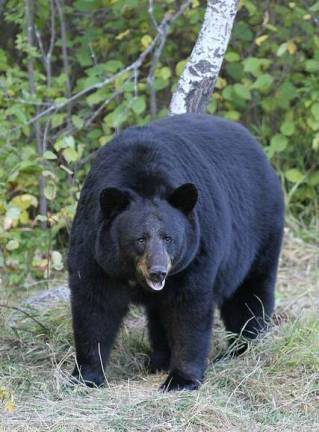By Carol Reif
TRENTON – The New Jersey Division of Fish and Wildlife has extended this year's bear hunt by four days because, it said, a minimum 20 percent of tagged bears had not been harvested by the scheduled close of the season on Saturday, Dec. 9.
The next phase of Segment B will begin a half-hour prior to sunrise on Wednesday, Dec. 13 and will continue until a half-hour after sunset on Saturday, Dec. 16.
The bear hunting zones include all of Sussex, Warren, Morris and Hunterdon counties, as well as portions of Passaic, Somerset, Bergen, and Mercer counties.
Harvest objectives, state officials say, "protect public safety and maintain a sustainable bear population."
Environmental conservationists argue, however, that not only is the hunt "not sustainable," but that the methodology used is "flawed."
The state’s bear hunting season is broken down into two segments. A total of 21 previously tagged bears have been brought into check stations during the two segments in October and December. The cumulative tagged bear harvest rate for both segments is 15.6 percent of the 135 tagged bears for this year.
Jeff Tittel, executive director of the New Jersey Sierra Club, said Monday that his organization challenged the state's methodology when it first started the hunt.
"This year shows how wrong their tagging methods are," Tittel said, adding: "Whether there is a hunt or not, there's no real management plan in place."
He did not elaborate on the ways the club feels the methodology is flawed.
The state’s bear hunting regulations call for the closure of the season once the cumulative rate of tagged bear brought to check stations for the October season (Segment A) and/or the December season (Segment B) reaches 30 percent.
Division of Fish and Wildlife Director Larry Herrighty, in announcing the extension Monday, defended the methodologies used as "scientific."
The goal, he said, is to maintain a “sustainable bear population in the areas of the state where the population is densest, at the same time enhancing public safety by reducing the risk of encounters that could threaten property or endanger people,”
Calling the approach "very successful," Herrightly said the hunt has “resulted in significant reductions in bear complaints.”
Tittel contends that a better plan is one that would include "strong education and uses warning signs in the region, education materials at trail heads, enforcing not feeding bears, and garbage management."
The black bear is, Tittel said, a "symbol that we still have wild places left in the state and we haven't completely given over to sprawl."
Tittel claimed that the bear population is so depleted that "there aren't many left to hunt."
Phil Murphy, New Jersey's Democratic governor-elect, is pushing a moratorium on the bear hunt.
"Extending the hunt is unbearable, even if authorized by the regulations." Tittel said. "It's just part of this, I think, narrow and petty part of this administration."
Because the incoming governor is talking about halting the hunt, "they want to kill every beart possible before leaving office," he added.
The state contends, however, that Northwestern New Jersey has one of the nation’s densest populations of black bears, a situation that has forced the animals to wander into more populated areas, increasing the risk of run-ins with people and property damage.
According to the state, the total number of bears harvested in October was 244. The preliminary total for the number of bears harvested in December to date is 138 for a season total of 382.
The Division of Fish and Wildlife utilizes the number of bears it has tagged during the year as the scientific basis for making determinations of attaining harvest objectives. Division biologists affix tags to bears whenever an animal is handled for research purposes or in response to a nuisance complaint.
Bear hunting in New Jersey was expanded to two segments in 2016, with a six-day season for archery and muzzleloader rifles in October and a second six-day shotgun and muzzleloader hunt in December.
Since the implementation of the two-segment system, the overall number of bear complaints has decreased 57 percent for the period Jan. 1 through Nov. 20 of this year, compared to the same period in 2016. The overall number of the most serious incidents, known as Category 1 incidents, has dropped 64 percent., according to the state.
For information on New Jersey’s 2017 black bear hunt, including current and past harvest numbers, visit: www.njfishandwildlife.com/bearseason_info.htm
For more information on black bears, including black bear biology and behavior, bear safety tips and bear education, visit: http://www.njfishandwildlife.com/bearfacts.htm
